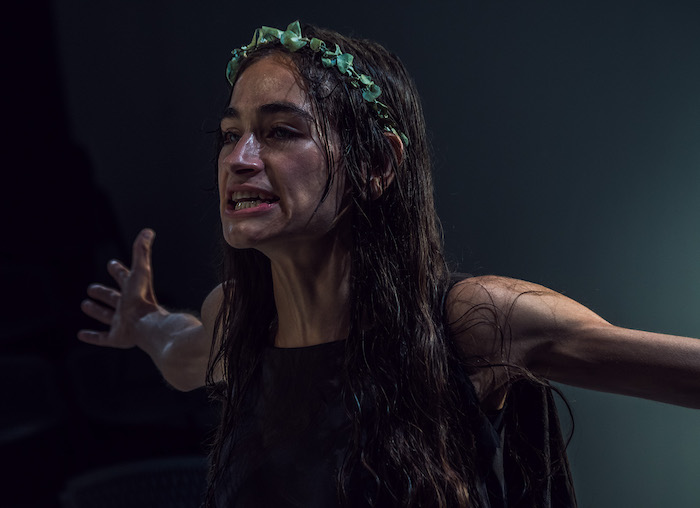
 [rating=4]Brian Parry is absolutely brilliant as King Kreon, ruler of Thebes, in Sophikles’ Ancient Greek classic “Antigone”, produced by Redtwist Theatre. In this 75-minute version of the story, based on a new translation by Anne Carson, Parry has met his match in Isabel Alamin, who impressively plays Antigone. Their powerful interaction transfixes the audience, as both make imposing claims to defend widely different points of view about the relationship between government, justice, and morality. While true to the original narrative, this adaptation of “Antigone” is not your grandparents’ version. Rather, the wording is “colloquial, light-fingered, and cutting.” And under the direction of Christine Freije, the show proceeds at a driving pace.
[rating=4]Brian Parry is absolutely brilliant as King Kreon, ruler of Thebes, in Sophikles’ Ancient Greek classic “Antigone”, produced by Redtwist Theatre. In this 75-minute version of the story, based on a new translation by Anne Carson, Parry has met his match in Isabel Alamin, who impressively plays Antigone. Their powerful interaction transfixes the audience, as both make imposing claims to defend widely different points of view about the relationship between government, justice, and morality. While true to the original narrative, this adaptation of “Antigone” is not your grandparents’ version. Rather, the wording is “colloquial, light-fingered, and cutting.” And under the direction of Christine Freije, the show proceeds at a driving pace.
After the death of King Oedipus of Thebes, his sons Polynices and Eteocles engage in a civil war against each other where both are killed. Eteocles was to be their father’s rightful heir; but with the death of both sons in battle, their uncle Kreon, has assumed the throne. Kreon decides that Eteocles is to be given a state funeral and buried as a hero, whereas Polynices is not to be buried at all or given any funeral rites, because he dared to defy the State and Eteocles. Kreon’s edict is for Polynices’ body to be eaten by dogs and for his eyes plucked out by birds.
Polynices and Eteocles have two sisters, Antigone and Ismene (Natalie Welber). Antigone is angered by her uncle Kreon’s order: By denying Polynices a proper burial, he is failing to keep the laws of the gods and is thumbing his nose at accepted morality. Thus she confides in her sister that she intends to bury her brother in secret under cover of darkness. Soulful and touching, Antigone is willing to risk death by invoking a Higher Power and embracing a morality greater than that of Kreon, who she believes has a misplaced focus on gaining earthly power to rival that of the gods. She insists that his claims for the need for stability and order in Thebes is only a cover for his willfulness, stubbornness, and narcissism. Confronting her “father-in-law to be” is not easy for Antigone, as she was prepared to marry his son Haimon (Nick Shank). Even Haimon pleads Antigone’s case to his father but to no avail. Kreon’s heart is further hardened, and Antigone craves death rather than dishonor for not carrying out her religious duty. It takes the blind soothsayer Teiresias (Javier Carmona) to let Kreon know just how much his affrontery to the gods and his blatant disregard for religious customs have angered the populace. Teiresias tries to talk sense into Kreon and have him back off on his edicts. Butthe gods in their anger have cast a series of plagues on the city. Misery eventually befalls Kreon’s home life as well.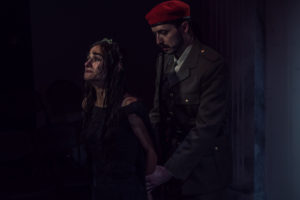
This compelling and forceful drama includes what is called the chorus, consisting of Andrew Bosworth (chorus leader), plus Peter Ferneding (who doubles as the guard), Joan Nahid (who doubles as Eurydike, Kreon’s wife), and Sarah Sapperstein (who doubles as the messenger). As a group, the chorus members help to accentuate the tale, provide a means of interpretation, and presage the action to come.
Since Redtwist Theatre is a small storefront, the play takes place on a tiny stage that niftily utilizes all of the aisles. Set design by Eric Luchen is good but minimal, as is the prop design by Jeff Brain. Costumes vary in quality and interest; some are more modern, some are more ancient, some are from the Middle Ages. Teiresias’ “seer’s costume” is the best, with its “Eye of God”, mala beads, cowbells, and the like, as well as his crooked cane with the lantern on top. Another great costume is one that Antigone wears before her death. Her flowing black shroud, size 0, is simple but highly appropriate, playing up her waiflike appearance. This is a credit to costume designer Anna Bodell. Sound design and lighting design are the dual province of Solomon Weisbard, who does a great job, especially with the multicolored lights.
While watching this performance, I could not help but think that had it not been for Kreon’s unjust action against her deceased brother, Antigone might not have had a reason to question her uncle’s judgments. In other words, the situation became personal, and this injustice became her wake-up call. Another thought is that a woman in Ancient Greece would have been considered a second-class citizen and would have normally deferred to the judgments of men. Yet there is an old Chinese proverb: “When sleeping women awake, mountains move.” As director Freije writes in the program notes, “In the midst of a chaotic present, while the new king Kreon is attempting to impose new, rigid laws, Antigone has her eyes set on the eternal. She may seem single-minded, like she’s following her own youthful whims, but, in fact, she’s looking at the big picture.”
Throughout the ages, Sophoklese’s play “Antigone” has provided a call for resistance to unjust, immoral, and intrusive governmental authority. In 1944, when Jean Anouilh wrote his version, it was at the height of the Nazi occupation of France. Back then, Kreon took on the role of the Vichy Government while the character of Antigone took on the role of the French Resistance. Of course, the playwright had to be very careful to work around the censors of that era, but a savvy audience understood his analogies.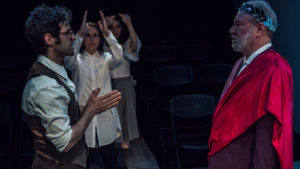
Today’s performance of “Antigone” is just as relevant and timely today as it was in Ancient Greece and in Vichy France. Given the politics of the present-day United States, we in the audience might make analogies to a very different set of events and circumstances. Antigone is the embodiment of “speaking truth to power.” She is bold and officious and fully knowledgeable about the risks and potential consequences of her actions. As I watched this show, my mind drifted, and I was making the comparison with Congresswoman Liz Cheney invoking the spirit of the U.S. Constitution in pitting herself against former President Donald Trump during the January 6th Committee hearings. Regardless of what politics you hold, there is most definitely a parallel here, and I happen to be writing this review on the day of the special Congressional hearing with Mark Meadows ex-aide Cassidy Hutchinson due to testify. But I digress here.
In all, this is a show about the destruction that can happen when a ruler seeks power for power’s sake and where his will becomes that of the State. Because we find Antigone—the small, slight-of-build woman that she is—so highly principled and just, she becomes a martyr for the cause of righteousness. We find this story so endearing, because she finds her confrontation with authority so heroic. This is the reason why this play has enthralled audiences all through the ages and why it could have easily been written today.
“Antigone” is playing at the Redtwist Theatre, 1044 W. Bryn Mawr Avenue, in Chicago, through July 31, 2022
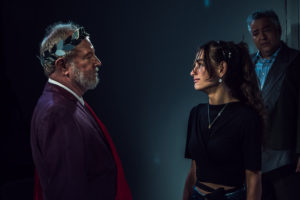 Performance schedule:
Performance schedule:
Thursdays, Fridays, Saturdays – 7:30 p.m.
Sundays – 3:00 p.m.
Tickets are $35 for the Thursday performances and
$40 for the Friday, Saturday, and Sunday performances.
For tickets and more information, go to https://www.redtwisttheatre.org/ or call 773-728-7529.
To see what others are saying, visit www.theatreinchicago.com,, go to Review Round-Up and click at “Antigone”.


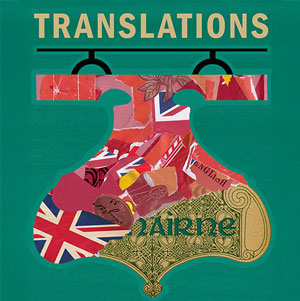



More Stories
“Translations”
“The Firebugs” reviewed by Julia W. Rath
“The Book of Grace” Al Bresloff with another from Paul LIsnek